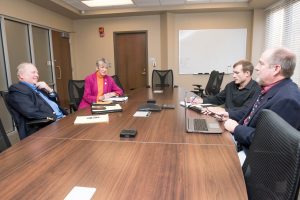
TUSCALOOSA, Ala. — Recent additions to The University of Alabama Cyber Institute along with refocusing research and academic priorities should help it respond to the challenges and opportunities for cyber to change the human condition nationally and in the state.
Researchers hired over the last few months will allow the Cyber Institute to branch into the areas of supply chain risk management and secure architecture as well as improve teaching in the cyber security area.
“The University is committed to building a first-class Cyber Institute, and the new additions expand our capabilities for success,” said Dr. Kevin Whitaker, UA executive vice president and provost.
Reg Hyde, executive director of the Cyber Institute, said his group will continue to take advantage of existing strengths on campus including the colleges of Arts & Sciences, Engineering, and Culverhouse College of Commerce, but is pivoting to new areas to support UA’s research goals.
“We are concentrating on areas where there is tremendous interest or demand among the private sector or government, but where there is little work being done, particularly by universities,” Hyde said. “In baseball terms, we’re trying to hit’em where they ain’t.”
A new research focus is supply chain risk management. Dr. Darryl Williams, one of the foremost experts in this field, joined the institute to lead this program. Williams has 20-plus years working on this subject with both government and the private sector.
Williams’ Supply Chain Risk Management and Analysis Laboratory is concerned with the integrity of systems and components in national security and defense systems and manufacturing base. Through the insertion of inferior or “doctored” components, the supply chains that support these programs can be maliciously compromised and degraded. This asymmetric vulnerability represents a significant national security challenge, and UA is the only university in the nation tackling the full scope of this threat.
Dr. David Mayhew recently joined the Cyber Institute to build another research focus. Mayhew leads the secure architecture program that develops trusted systems and standards as well as proven, verifiable protection of trustworthy, high-assurance security to address the problems of adversarial attacks, including software subversion. Mayhew is working to develop this program, working with both government and private sector partners.
“We believe that his unique approach to cyber defense will enable a leap forward in cyber security defense and enable the security of a range of systems including mobile systems,” Hyde said.
Most recently, Mayhew was at the University of San Diego, and he comes to the University after more than 30 years of industry experience, having participated on major project teams at IBM, Intel, AMD, DEC and Alcatel.
Although Mayhew and Williams are new additions to the University’s research efforts, signs are promising for both programs as there has been interest in collaborating with UA from the U.S. Department of Defense, Fortune 500 companies and the intelligence community, Hyde said.
Dr. Winnie Callahan, a leader in cybersecurity education for the past 20 years, also joined the institute. As director of Cyber Academic Programs for the Cyber Institute, Callahan oversees diverse educational programs aimed at creating a highly qualified cyber workforce. She also spearheads novel research efforts and economic development projects to bring more technology companies to the University.
She comes from the University of San Diego, where she was founding director of the USD Center for Cyber Security Engineering and Technology. She also was the founding executive director of the Peter Kiewit Institute at the University of Nebraska, and developed cyber security and informatics programs at the University of Southern California.
Contact
Adam Jones, UA communications, 205-348-4328, adam.jones@ua.edu
